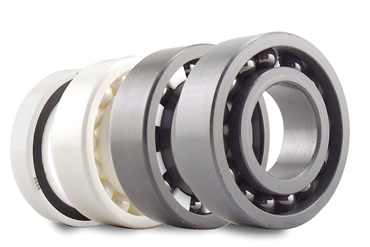Full Ceramic Bearings

Full Ceramic Bearings have races and balls that are made entirely of ceramic material and are superior to common steel bearings in many ways. Ceramic is the perfect material for any application seeking to achieve higher RPM’s, reduce overall weight or for extremely harsh environments where high temperatures and corrosive substances are present.
Full Ceramic Bearings are usually made of following materials:
- Silicon Nitride (SiN4)
- Alumina Oxide (Al2O3)
- Zirconia Oxide (ZrO2)
- Silicon Carbide (SiC)
Because ceramic is a glass like surface it has an extremely low coefficient of friction and is ideal for applications seeking to reduce friction. Ceramic balls require less lubrication and have a greater hardness than steel balls which will contribute to increased bearing life. Thermal properties are better than steel balls resulting in less heat generation at high speeds.
Full Ceramic Bearing Benefits
- Will not corrode or rust
- 2/3 the weight of steel
- Resistant to resist acids, alkali, blood, salt and water
- Extremely low coefficient of friction and thermal expansion
- Lower friction results in less energy consumed
- Operating Temperature from as low as (-85°C) up to (+ 900°C)
Full Ceramic Bearing Applications
Full Ceramic bearings are used in specialty applications like chemical baths, vacuum environments, semiconductor manufacturing, food processing industries, radiotherapy, MRI, patient positioning systems and more. Any extreme environment that requires non-corrosive, non-conductive or non-magnetic bearings is ideal for full ceramic bearings.
Full Ceramic Articles & Resources
Full Ceramic Bearings Play Hardball
Ceramic Bearing Properties & Characteristics
Ceramic Bearing vs. Steel Bearing Material Comparison Chart
